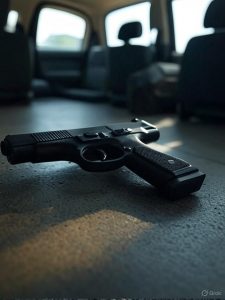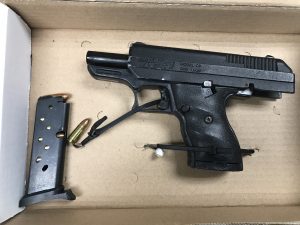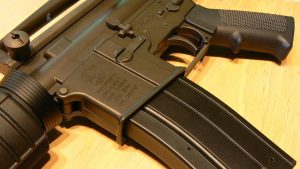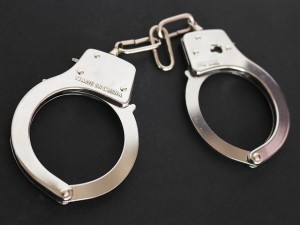 A Virginia man was recently indicted in the Circuit Court for Saint Mary’s County after he crashed his car at the Maryland International Raceway. Thankfully, the 37-year-old was a spectator and not a participant in any of the drag races at the Mechanicsville track. According to reports an off-duty state trooper working security at the track responded to a multi vehicle crash involving a SUV and a parked recreational vehicle. The defendant apparently crashed his Chevy Suburban into the unoccupied RV shortly before the off-duty trooper arrived. Upon contacting the driver, the trooper allegedly observed the defendant to have glassy, bloodshot eyes and slurred speech. These are the initial signs of driving under the influence, and almost all DUI reports will contain this standard language (even if not true). At some point during the interaction the trooper observed in a firearm in plain view on the driver’s side floorboard of the vehicle. This alone would have given the trooper probable cause to detain the driver, but it appears that field sobriety tests were administered before the arrest.
A Virginia man was recently indicted in the Circuit Court for Saint Mary’s County after he crashed his car at the Maryland International Raceway. Thankfully, the 37-year-old was a spectator and not a participant in any of the drag races at the Mechanicsville track. According to reports an off-duty state trooper working security at the track responded to a multi vehicle crash involving a SUV and a parked recreational vehicle. The defendant apparently crashed his Chevy Suburban into the unoccupied RV shortly before the off-duty trooper arrived. Upon contacting the driver, the trooper allegedly observed the defendant to have glassy, bloodshot eyes and slurred speech. These are the initial signs of driving under the influence, and almost all DUI reports will contain this standard language (even if not true). At some point during the interaction the trooper observed in a firearm in plain view on the driver’s side floorboard of the vehicle. This alone would have given the trooper probable cause to detain the driver, but it appears that field sobriety tests were administered before the arrest.
As with all gun cases the trooper contacted the gun center to determine if the defendant had a valid concealed carry permit. Not only was he carrying without a valid Maryland permit, but he was also prohibited from possessing a firearm due to a 2011 assault conviction. This took the case from a misdemeanor wear, transport and carry case to a felony unlawful possession of a firearm charge. Under the Maryland Public Safety Code section 5-133 a person found in possession of a firearm after being a convicted felon or having a conviction for misdemeanor assault faces up to 15 years in prison for having a gun. The first 5 years is without parole, but there is one exception that does appear to apply to this defendant. If a person completes his or her sentence (including probation) more than 5 years before the new case, then the 5-year prison term is not mandatory. This defendant was convicted of assault in 2011, which means he was likely off parole and/or probation more than 5 years ago.
Upon being placed under arrest the defendant was taken back to the barracks and offered a breathalyzer test. He consented to the test and blew .16, which is twice the legal limit of .08. The arresting officer issued 5 total citations including DUI, DUI per se, DWI, reckless driving and negligent driving. Maryland State Troopers often add reckless and negligent tickets in their drunk driving stops, and all law enforcement officers usually charge both DUI and DWI. DUI per se is charged when a defendant blows over .08 on the breathalyzer. Defendants in Maryland DUI cases typically face several citations, and in some cases, it could be as many as 10 or more. In reality a good defense strategy should result in most of the citations being dismissed, so it’s best not to pay the payable citations before court.
 Criminal Defense Lawyer Blog
Criminal Defense Lawyer Blog






